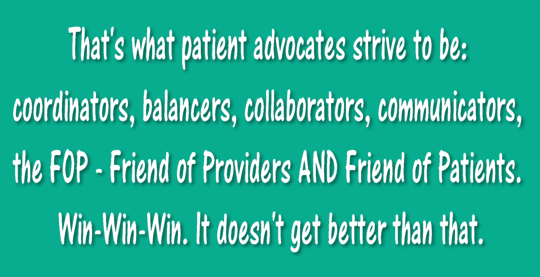Posted in the APHA Discussion Forum by one of our member advocates,
In the last week I have received calls from 2 potential clients whose physicians actually advised them to get a Patient Advocate! One was for medical insurance denials and the other was for patient navigation. It makes me really happy that physicians in my area are recognizing that we exist and can help their patients.
Followed shortly thereafter by another advocate who observed,
I know the clinicians I encounter learn to deeply appreciate my role-and, except for those who are dismissed, become more deeply engaged with my clients, who are their patients. MDs seem to be relieved with the presence of another pair of eyes scrutinizing the medical history, reviewing the pharmaceuticals (and my invariable submission of corrections to the medication record residing within the EHR), researching clinical guidelines, finding ways to better coordinate care, and averting potential catastrophes.
And still another who added,
We get lots of referrals from physicians. We just did a webinar for a group of physicians in our area. It’s a great way to get the word out. Glad to hear others are experiencing the same!
So why is all this news, and why does it belong in this blog?
A little history….
Early in the genesis of the great profession of patient advocacy, the story was quite different, and that, then, was also reflected in our discussion forum. At that time we were talking about the fact that physicians and nurses were often threatened by the presence of a patient advocate, both in the exam room and the hospital bedside. Physicians jumped to the conclusion that they would be second-guessed, while hospital personnel were afraid someone was planning to blow them in for substandard care.
Now, I’m not going to address the paranoia here… but what I am going to address is this….
They were wrong! And they have figured that out!
The tide began to turn early, but like all important things, it took some time to become mainstream. A few years ago, I was speaking to a large group of doctors and nurses about communicating with their patients. Thrown into the mix was “if your patient has an advocate, embrace that advocate – it’s good for all of you” message. One nurse immediately stood up to tell me that there was no way SHE wanted an extra person around because all that person would do would be to cause trouble. She already had enough pressure without having to make a stranger happy…. But before she could even finish, a physician jumped up to tell her she was wrong! What the physician had learned about patient advocates was that they are boots-on-the-ground with her patients, making sure they better understand their medical situations, and making them far more adherent with treatment….
The physician was right, and I was thrilled. She really got it. She understood that advocates help her patients and make her look good, too.
That’s what we, as patient advocates, strive to be: coordinators, balancers, collaborators, communicators, the FOP – Friend of Providers AND Friend of Patients. Win-Win-Win. It doesn’t get better than that.
Our roles, as we see it, and now as providers and patients better understand, are to be the people who facilitate all aspects of care while the patient safely moves toward his or her best outcomes. We help providers communicate with their patients, we help patients ask good questions, we double check treatment instructions, we help patients follow them, we second-guess insurance denials and permissions so that doctors can recommend the treatments they think will best serve patients, and make sure patients get the full benefits they deserve, have made the choices they think are best for themselves, and have paid no more than they should have to pay for.
Now – do we make every provider happy every time? No, of course not. And will all patient-clients get what they want to get? No, and sometimes that isn’t in their best interest anyway.
When the presence of a patient advocate is appreciated not solely by clients, but by clients’ providers too – that’s how we know we have “arrived” and are bringing value to the entire system.

Do you know of a physician you’d like to impress about the value of patient advocates?
Print out this post or send him or her a link to this post. We want the physicians you work with to understand it, too.
LEARN ABOUT APHA MEMBERSHIP | FIND MORE REASONS PATIENTS NEED ADVOCATES






Ah yes, how things have changed for us over the last years, Trisha! Thank you for your post and continued efforts to have patient advocates understood and supported for a variety of services.
Almost all of the physicians that I have encountered have been very appreciative of having me in the room with their patient. This is especially true for those individuals within the geriatric age range. After insuring that my friends are given the opportunity to tell their story and respond to their doctor’s questions, I attempt to fill in some of the details and ask clarifying questions always attempting to be respectful and mindful of the patient’s dignity. I think some of the behaviors that physician’s might resent arise from advocates who are not respectful of the doctor’s time, education, and experience. (eg. Expecting the doctor to discuss 40 pages of irrelevant internet information printed out the evening before the visit.
I also have encountered very positive experiences with physicians. I do have a favorite example that in hind sight, wish I could have video taped! I was in a SNF with a client that I had recently signed a contract with. This client had a long history of CHF and COPD. At the time, she was post fall and was receiving rehab, post hospitalization. After 3 consecutive days of weight gain, increased pitting bi-laterally lower extremities, and little to no response from the nursing staff or the facility doctor, I decided to contact her PCP. I introduced myself, explained that I was with his patient, described what I was observing, and he asked if there was any way to get her to his office. I received permission from the family to have her transported (arranged by the facility) and that the office visit would need to be paid for out of pocket. The family quickly authorized what the PCP had requested. I met her at the appointment the same afternoon and the PCP was floored with her poor condition. He asked me , “who are you again and how did you enter the picture?” He then asked who the facility doctor was. I gave him the name and he completely lost it. “I play golf with him!” He explained that it was his medical opinion, that this women would have not survived the weekend and that he was calling an ambulance to have her re-admitted to the hospital. He explained he’d never had an experience with an Advocate. He was in total disbelief of the substandard care she was receiving. We reviewed when the client and family retained my service, the services I was to provide under my service contract and my background. His closing comment was that he wished all of his patients had access to an Advocate. I left him some of my cards and I have had 3 clients contact me that have him for a PCP.
There are some that understand. I continue to speak and educate wherever there is an opportunity. This particular physician is spreading the word among his colleagues. Whether it is about better quality of patient care, preventing a re-admission, or having a presence in a SNF. Bottomline is we are on the side of the patient. Ultimately, it can and should be a team effort.
Trisha,
My firm has been contacted twice in the past three weeks from physician offices seeking advocacy for their patients. To their credit, the physicians see the need for personalized care beyond the examining table and in both cases turned to Google to find a solution for their patients. Partnering up with doctors is a triple-play win (patient, physician and advocate) and a telling sign of how the landscape is changing in medicine.
Thank you Trisha for your continued encouragement.
AnnMarie McIlwain
Definitely a win for all!